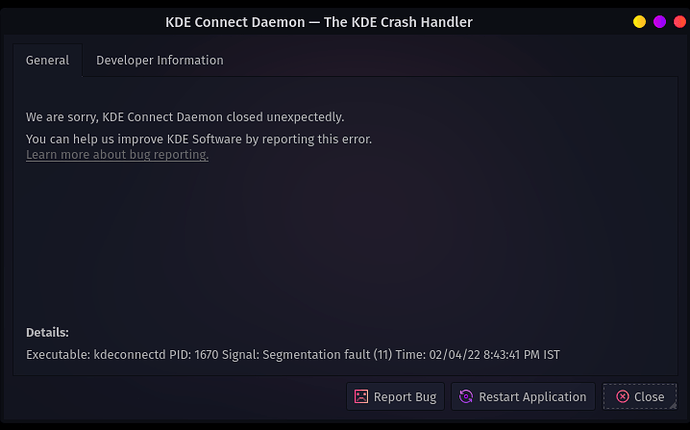Hello.
So today I have got this KDE connect error after every reboot it crashes and asks to restart application. Also it comes up with a pop up in notification Dr Konki crash
Below is the SS
garuda-inxi
System:
Kernel: 5.17.1-zen1-1-zen arch: x86_64 bits: 64 compiler: gcc v: 11.2.0
parameters: BOOT_IMAGE=/@/boot/vmlinuz-linux-zen
root=UUID=0b3ee793-04a5-4396-a397-8dbad9c6feeb rw rootflags=subvol=@
quiet quiet splash rd.udev.log_priority=3 vt.global_cursor_default=0
resume=UUID=684fccb6-7d6a-4eda-8875-5b25dc60d985 loglevel=3 i8042.nokbd
Desktop: KDE Plasma v: 5.24.4 tk: Qt v: 5.15.3 info: latte-dock
wm: kwin_x11 vt: 1 dm: SDDM Distro: Garuda Linux base: Arch Linux
Machine:
Type: Laptop System: Hewlett-Packard product: HP Pavilion g6 Notebook PC
v: 0884110000385910000610100 serial: <superuser required> Chassis: type: 10
serial: <superuser required>
Mobo: Hewlett-Packard model: 183E v: 56.32 serial: <superuser required>
UEFI: Insyde v: F.22 date: 11/22/2012
Battery:
ID-1: BAT0 charge: 15.6 Wh (100.0%) condition: 15.6/15.6 Wh (100.0%)
volts: 12.4 min: 10.8 model: Hewlett-Packard Primary type: Li-ion
serial: N/A status: full
CPU:
Info: model: Intel Core i3-3110M bits: 64 type: MT MCP arch: Ivy Bridge
family: 6 model-id: 0x3A (58) stepping: 9 microcode: 0x21
Topology: cpus: 1x cores: 2 tpc: 2 threads: 4 smt: enabled cache:
L1: 128 KiB desc: d-2x32 KiB; i-2x32 KiB L2: 512 KiB desc: 2x256 KiB
L3: 3 MiB desc: 1x3 MiB
Speed (MHz): avg: 1237 high: 1345 min/max: 1200/2400 scaling:
driver: intel_cpufreq governor: schedutil cores: 1: 1345 2: 1209 3: 1197
4: 1197 bogomips: 19155
Flags: avx ht lm nx pae sse sse2 sse3 sse4_1 sse4_2 ssse3 vmx
Vulnerabilities:
Type: itlb_multihit status: KVM: VMX disabled
Type: l1tf
mitigation: PTE Inversion; VMX: conditional cache flushes, SMT vulnerable
Type: mds mitigation: Clear CPU buffers; SMT vulnerable
Type: meltdown mitigation: PTI
Type: spec_store_bypass
mitigation: Speculative Store Bypass disabled via prctl
Type: spectre_v1
mitigation: usercopy/swapgs barriers and __user pointer sanitization
Type: spectre_v2 mitigation: Retpolines, IBPB: conditional, IBRS_FW,
STIBP: conditional, RSB filling
Type: srbds status: Not affected
Type: tsx_async_abort status: Not affected
Graphics:
Device-1: Intel 3rd Gen Core processor Graphics vendor: Hewlett-Packard
driver: i915 v: kernel ports: active: LVDS-1 empty: DP-1,HDMI-A-1,VGA-1
bus-ID: 00:02.0 chip-ID: 8086:0166 class-ID: 0300
Device-2: AMD Thames [Radeon HD 7500M/7600M Series]
vendor: Hewlett-Packard driver: radeon v: kernel alternate: amdgpu pcie:
gen: 1 speed: 2.5 GT/s lanes: 8 link-max: gen: 2 speed: 5 GT/s lanes: 16
bus-ID: 01:00.0 chip-ID: 1002:6840 class-ID: 0300
Device-3: Suyin HP TrueVision HD Integrated Webcam type: USB
driver: uvcvideo bus-ID: 2-1.5:3 chip-ID: 064e:e263 class-ID: 0e02
serial: <filter>
Display: x11 server: X.Org v: 1.21.1.3 compositor: kwin_x11 driver: X:
loaded: modesetting,radeon alternate: fbdev,intel,vesa gpu: i915
display-ID: :0 screens: 1
Screen-1: 0 s-res: 1366x768 s-dpi: 96 s-size: 361x203mm (14.21x7.99")
s-diag: 414mm (16.31")
Monitor-1: LVDS-1 model: LG Display 0x034d built: 2012 res: 1366x768
hz: 60 dpi: 101 gamma: 1.2 size: 344x194mm (13.54x7.64")
diag: 395mm (15.5") ratio: 16:9 modes: 1366x768
OpenGL: renderer: Mesa Intel HD Graphics 4000 (IVB GT2)
v: 4.2 Mesa 22.0.0 compat-v: 3.1 direct render: Yes
Audio:
Device-1: Intel 7 Series/C216 Family High Definition Audio
vendor: Hewlett-Packard driver: snd_hda_intel v: kernel bus-ID: 00:1b.0
chip-ID: 8086:1e20 class-ID: 0403
Sound Server-1: ALSA v: k5.17.1-zen1-1-zen running: yes
Sound Server-2: PulseAudio v: 15.0 running: no
Sound Server-3: PipeWire v: 0.3.49 running: yes
Network:
Device-1: Ralink RT3290 Wireless 802.11n 1T/1R PCIe vendor: Hewlett-Packard
driver: rt2800pci v: 2.3.0 pcie: gen: 1 speed: 2.5 GT/s lanes: 1
bus-ID: 07:00.0 chip-ID: 1814:3290 class-ID: 0280
IF: wlo1 state: down mac: <filter>
Device-2: Realtek RTL810xE PCI Express Fast Ethernet
vendor: Hewlett-Packard driver: r8169 v: kernel pcie: gen: 1
speed: 2.5 GT/s lanes: 1 port: 3000 bus-ID: 08:00.0 chip-ID: 10ec:8136
class-ID: 0200
IF: eno1 state: up speed: 100 Mbps duplex: full mac: <filter>
Bluetooth:
Device-1: Ralink RT3290 Bluetooth vendor: Hewlett-Packard driver: N/A pcie:
gen: 1 speed: 2.5 GT/s lanes: 1 bus-ID: 07:00.1 chip-ID: 1814:3298
class-ID: 0d11
Report: bt-service: enabled,stopped note: tool can't run
Drives:
Local Storage: total: 931.51 GiB used: 12.37 GiB (1.3%)
SMART Message: Unable to run smartctl. Root privileges required.
ID-1: /dev/sda maj-min: 8:0 vendor: Seagate model: ST1000LM024 HN-M101MBB
size: 931.51 GiB block-size: physical: 4096 B logical: 512 B
speed: 6.0 Gb/s type: HDD rpm: 5400 serial: <filter> rev: 0001
scheme: GPT
Partition:
ID-1: / raw-size: 915.01 GiB size: 915.01 GiB (100.00%)
used: 12.37 GiB (1.4%) fs: btrfs dev: /dev/sda3 maj-min: 8:3
ID-2: /boot/efi raw-size: 512 MiB size: 511 MiB (99.80%)
used: 576 KiB (0.1%) fs: vfat dev: /dev/sda1 maj-min: 8:1
ID-3: /home raw-size: 915.01 GiB size: 915.01 GiB (100.00%)
used: 12.37 GiB (1.4%) fs: btrfs dev: /dev/sda3 maj-min: 8:3
ID-4: /var/log raw-size: 915.01 GiB size: 915.01 GiB (100.00%)
used: 12.37 GiB (1.4%) fs: btrfs dev: /dev/sda3 maj-min: 8:3
ID-5: /var/tmp raw-size: 915.01 GiB size: 915.01 GiB (100.00%)
used: 12.37 GiB (1.4%) fs: btrfs dev: /dev/sda3 maj-min: 8:3
Swap:
Kernel: swappiness: 133 (default 60) cache-pressure: 100 (default)
ID-1: swap-1 type: zram size: 7.66 GiB used: 0 KiB (0.0%) priority: 100
dev: /dev/zram0
ID-2: swap-2 type: partition size: 16 GiB used: 0 KiB (0.0%) priority: -2
dev: /dev/sda2 maj-min: 8:2
Sensors:
System Temperatures: cpu: 67.0 C mobo: N/A gpu: radeon temp: 61.0 C
Fan Speeds (RPM): N/A
Info:
Processes: 253 Uptime: 13m wakeups: 1 Memory: 7.66 GiB
used: 2.96 GiB (38.7%) Init: systemd v: 250 tool: systemctl Compilers:
gcc: 11.2.0 Packages: 1377 pacman: 1373 lib: 357 flatpak: 4 Shell: fish
v: 3.4.1 default: Bash v: 5.1.16 running-in: konsole inxi: 3.3.14
Garuda (2.5.6-2):
System install date: 2022-04-02
Last full system update: 2022-04-02
Is partially upgraded: No
Relevant software: NetworkManager
Windows dual boot: No/Undetected
Snapshots: Snapper
Failed units: bluetooth-autoconnect.service
Can someone please help me with this. I have even tried reinstall KDE connect but it still crashes.
